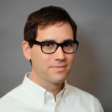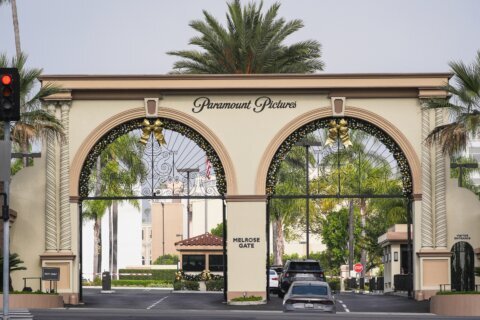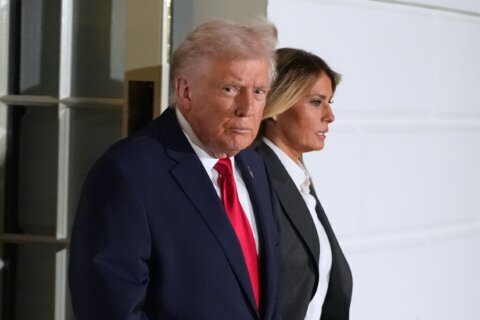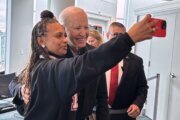The impeachment inquiry into President Donald John Trump began Sept. 24. In this occasional feature, WTOP will touch on the week’s events — and answer some of the questions they raise — as this historic process unfolds in D.C.
Nov. 1–7
This week, House investigators opened the impeachment inquiry’s doors, so to speak, when it released transcripts of several closed-door interviews.
Hundreds upon hundreds of pages were released, giving the public a chance to see what it will soon hear next week, when actual doors literally open to cameras — and the eyes of the nation — as part of the investigation’s next phase. You’ll recall that this format was laid out last week with a House resolution formalizing the inquiry.
Meanwhile, a related story about a Giuliani associate became even more relevant.
Q: When are the hearings next week? And who’s talking?
Public testimony begins Wednesday, with Deputy Assistant Secretary of State George Kent and acting ambassador to Ukraine Bill Taylor. On Friday, Nov. 15, the former U.S. ambassador to Ukraine, Marie Yovanovitch, will testify.
“Those open hearings will be an opportunity for the American people to evaluate the witnesses for themselves, to make their own determinations about the credibility of the witnesses, but also to learn firsthand about the facts of the president’s misconduct,” said Rep. Adam Schiff, the California Democrat who is leading the inquiry’s new phase.
Q: What new information is in these transcripts of closed-door testimony?
A fair amount. Some highlights are below, as are links to each full transcript.
She told investigators that Ukrainian officials had warned her that Trump and his personal attorney, Rudy Giuliani, planned to “do things, including to me” and were “looking to hurt” her.

She also learned that Giuliani was interested in investigating Joe Biden and the energy company Burisma, on whose board Biden’s son, Hunter Biden, was a member. Of particular interest, she said: “Finding things that could be possibly damaging to a presidential run” and evidence backing the conspiracy theory of Ukrainian interference in the 2016 U.S. presidential election.
(For the record: U.S. intelligence officials concluded years ago that Russia, not Ukraine, meddled in the 2016 election.)
The names of Lev Parnas and Igor Fruman also came up in her testimony. They have been indicted and are accused of funneling foreign money to U.S. politicians in an effort to influence relations with Ukraine. Yovanovitch testified that, before her removal this spring, the pair had been part of Giuliani’s effort to remove her.
“… They needed a better ambassador to sort of facilitate their business’ efforts here,” she said.
This smear campaign by Trump loyalists undermined her, she said. And despite multiple requests, Secretary of State Mike Pompeo would never issue a statement defending her. But Gordon Sondland, the ambassador to the European Union, offered some advice on gaining favor: “Tweet out there that you support the president.”
You might have heard that the ambassador made noteworthy changes to his earlier testimony. Back on Oct. 17, he claimed to not recall “taking part in any effort to encourage an investigation into the Bidens.” He also underscored the enormity of the allegations facing Trump.
Let me state clearly, inviting a foreign government to undertake investigations for the purpose of influencing an upcoming U.S. election would be wrong. Withholding foreign aid in order to pressure a foreign government to take such steps would be wrong. I did not and would not ever participate in such undertakings.
Opening statements from Bill Taylor and former National Security Council official Tim Morrison, however, reminded him of at least one conversation.
Sondland now says that nearly $400 million in military aid to Ukraine was indeed being withheld until the then-new president, Volodymyr Zelenskiy, would publicly declare an investigation into the 2016 election and Burisma, at Giuliani’s urging.
I now recall speaking individually with [Zelenskiy aide Andriy] Yermak [on Sept. 1], where I said that resumption of U.S. aid would likely not occur until Ukraine provided the public anti-corruption statement that we had been discussing for many weeks.
Democrats contend this is more evidence of a quid pro quo.
For what it’s worth: Last week, Lt. Col. Alexander Vindman told investigators that Sondland had told a visiting Ukrainian official in July that “delivering specific investigations” was needed to secure a White House visit that Zelenskiy was seeking.
Sondland also testified Oct. 17 that when he discussed the topic of Giuliani’s activities with Pompeo, the secretary of state rolled his eyes and said, “Yes, it’s something we have to deal with.”
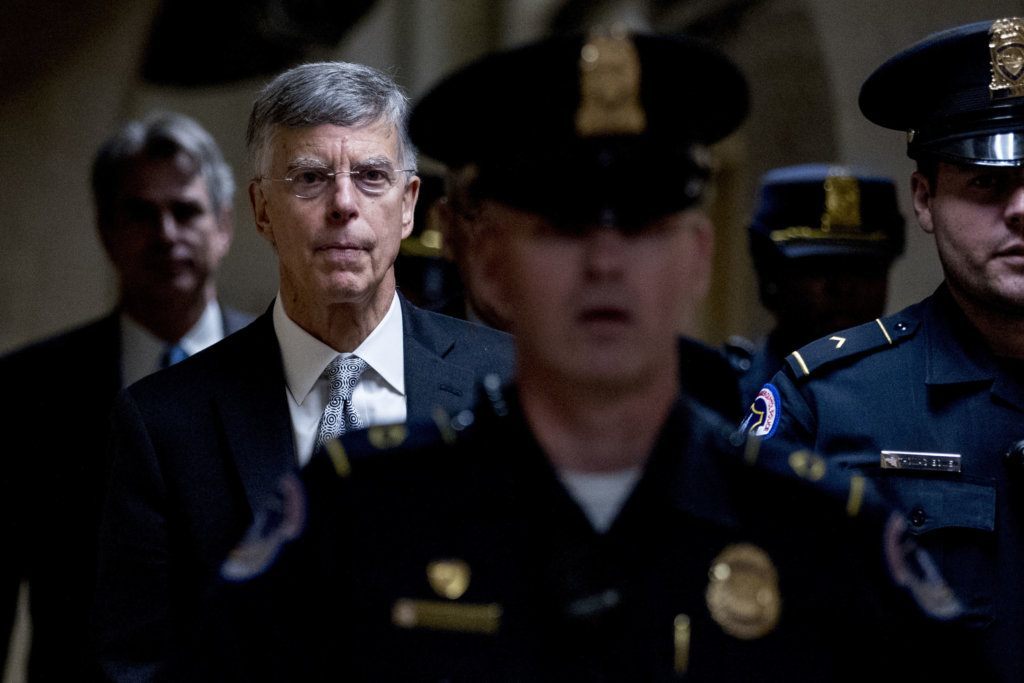
The top U.S. diplomat for Ukraine told investigators that he had been wary of taking the job after Yovanovitch’s removal, citing “snake pits” in D.C. and Kyiv. After taking it, he eventually learned of the “irregular” diplomatic channel “guided by Giuliani” and involving Energy Secretary Rick Perry, Sondland and Ukrainian envoy Kurt Volker.
In addition, he corroborated other testimony that said the White House would provide aid to Ukraine on condition of an investigation into Burisma “to cast Vice President Biden in a bad light.”
“That was my clear understanding — security assistance money would not come until the president committed to pursue the investigation,” he said.
Taylor also recounted his efforts to get the military aid restored, at one point writing a cable to Pompeo, who never replied.
The deputy assistant secretary for European and Eurasian affairs also corroborated testimony about White House pressure to investigate Democrats. He said Sondland had told associates that “POTUS wanted nothing less than President [Zelenskiy] to go to microphone and say investigations, Biden and Clinton.”
He also detailed a “campaign of slander” by Giuliani against Yovanovitch: “Mr. Giuliani was almost unmissable [on television and social media] starting in mid-March,” said Kent, who testified that he, too, sought a “clear statement of support” by the State Department for the ambassador — unsuccessfully.
In addition, Kent described how by mid-July, he was reluctant to discuss his concerns about Giuliani’s activities with the State Department: “… After Giuliani attacked me, as well as Ambassador Yovanovitch and the entire embassy, in his late May interview, I was told to keep my head down and lower my profile in Ukraine,” he said.
Q: Who else is talking to investigators?
Thirteen witnesses were scheduled to testify behind closed doors this week, but most didn’t show up.
One exception is Jennifer Williams, a foreign service officer working in Vice President Mike Pence’s office, who was listening in on the July 25 “do us a favor, though” phone call between Trump and Zelenskiy. Another exception is David Hale, a State Department employee.
No-shows included Perry and acting White House Chief of Staff Mick Mulvaney. Also a no-show: former national security adviser John Bolton, but he indicated Thursday that he would be willing to testify.
What will probably determine how soon Bolton does testify is a ruling on his former National Security Council deputy, Charles Kupperman. He has filed a suit asking a federal court to decide for him whether to follow a House subpoena or the White House’s direction to not testify.
Kupperman and Bolton share the same attorney.
Another person willing to honor his subpoena: Parnas. His attorney said Monday that the Giuliani associate was “very disappointed” that the president claimed not to know him after his arrest.
“Any sentient being looking at the public record of the president and Parnas together — during intimate dinners, waving to each other at rallies, taking pictures together, and of Parnas’s alleged involvement with the president’s lawyer Rudy Giuliani — could divine that the president and Parnas knew each other,” Joseph Bondy said in a statement to The Washington Post.
Earlier:

